 Your new post is loading...
 Your new post is loading...

|
Scooped by
James Schreier
September 4, 2013 3:06 AM
|
"All the problems of the world could be settled easily if men were only willing to think. The trouble is that men very often resort to all sorts of devices in order not to think, because thinking is such hard work." (Thomas Watson, IBM)

|
Scooped by
James Schreier
December 15, 9:00 AM
|
New research finds that brain development is not linear. There are distinct phases with unique characteristics.

|
Scooped by
James Schreier
December 15, 9:00 AM
|
What does it mean to add value? Adding value arises not just from solving a problem, but from solving the right problem, in ways that no one expected, to arrive at an even better outcome. These kinds of solutions don’t come from our everyday ways of thinking. They come from expert thinking , critical thinking , strategic thinking , and systems thinking —skills that consistently make it on those ubiquitous lists of things leaders at every level have to be really good at to meet the challenges of the future. If you’re a leader looking for your company to add value for clients and customers, or a manager looking for ways your team can add value, you need to be building these skills in your people. The problem for many leaders and managers, however, is that when we use terms like expert, critical, strategic, or systems thinking, too often we don’t know when to apply or even how to define them. The authors explore these four distinct types of thinking skills in depth, including what they mean and when they should be used, along with some tips for using AI tools as a thinking partner.

|
Scooped by
James Schreier
December 8, 9:00 AM
|
Brain scans of 3,802 people show how the brain’s structure changes at four major turning points.

|
Scooped by
James Schreier
December 1, 9:00 AM
|
Talking about the past doesn’t just let you relive lovely memories. It may help you stay sharp in the future.

|
Scooped by
James Schreier
November 24, 11:56 AM
|
We already know how watching other people’s lives on social media can negatively affect our self-esteem and satisfaction with our own lives. Apparently, using apps to track your own calories or fitness activities can have a similar effect. The latest research from scientists at University College…

|
Scooped by
James Schreier
November 10, 10:25 AM
|
Sleep isn't just rest, it's a crucial biological process. It keeps your mind sharp, your thoughts clear, and your reactions quick. But in today's fast-paced world, skipping sleep has become common, even though our bodies crave it as much as oxygen.

|
Scooped by
James Schreier
November 2, 8:00 AM
|
This week on my podcast, I delved deep into the neural mechanisms involved in making your phone so irresistible. To summarize, there are bundles of ... Read more

|
Scooped by
James Schreier
October 20, 9:00 AM
|
Your attention is your most valuable currency
and most people spend it without realizing.
Neuroscience shows that every notification, scroll, and
“quick check” triggers a tiny hit of dopamine; a reward loop that feels productive but quietly exhausts the brain.

|
Scooped by
James Schreier
October 20, 9:00 AM
|
Soccer heading has long been suspected of impacting brain health, but exactly where and how it leaves a mark has been a blind spot. Now, for the first time, scientists have a clear picture of the damage and why the zone of impact contributes to issues with learning and problem-solving over time.

|
Scooped by
James Schreier
October 13, 9:00 AM
|
A study published today in the journal Science Advances found that mundane memories get extra sticking power in the brain if they are connected to a significant event. These events include something surprising, rewarding, or events with an emotional punch.

|
Scooped by
James Schreier
October 13, 9:00 AM
|
A healthy brain maintains a harmony of neurons that excite or inhibit other neurons, but the lines between different types of cells are blurrier than researchers once thought.

|
Scooped by
James Schreier
October 9, 11:27 AM
|
We've all experienced defeat at some point – losing a game, a potential new job, a debate. Now, a new study has found that the brain may learn from losing to others, with a specific group of neurons tied to defeat that then changes our future behavior.
|

|
Scooped by
James Schreier
December 15, 9:00 AM
|
Can ChatGPT help researchers understand how the human brain handles language?

|
Scooped by
James Schreier
December 15, 9:00 AM
|
UK academics say latest chemicals are ‘wake-up call’ and urge global action to stop weaponisation of neuroscience

|
Scooped by
James Schreier
December 8, 9:00 AM
|
Resilience is often presented as feats of bravery and endurance. But everyday practices like journaling, drafting a text or even writing a to-do list are manifestations of a capacity to adapt.

|
Scooped by
James Schreier
December 1, 11:50 AM
|
In the first US study looking at whether the recommended fluoride levels in drinking water affects brain function, researchers have found that the hot-button mineral has no negative impacts on cognition – and may actually be giving it a boost.

|
Scooped by
James Schreier
December 1, 9:00 AM
|
In a new study, researchers discovered that the human brain has four pivotal periods when it goes through marked changes, sparking five "epochs" that last for years. The adolescent phase, for example, was found to extend into our early 30s.

|
Scooped by
James Schreier
November 17, 9:00 AM
|
A sudden flash of insight is a product of your brain. Neuroscientists track the neural activity underlying an “aha” and how it might boost memory.

|
Scooped by
James Schreier
November 3, 8:00 AM
|
Researchers found AI models trained on shortform, clickbait-y content experienced irreversible cognitive decline.

|
Scooped by
James Schreier
October 27, 9:00 AM
|
Your brain is the most valuable tool you own.
When it works better, everything else falls into place.
The path to a sharper, more powerful mind is easier than you think.
And something we should all be working on!
8 Game-changing truths about your brain
(And how to use them):
1. Stress Is shrinking your brain
↳ Stress lowers cortisol, reducing focus & stamina.
↳ Practice daily mindfulness & deep breathing.
2. Loneliness is the new smoking
↳ Strong relationships increase emotional wellbeing.
↳ Schedule meetups & meaningful conversation.
3. Sleep deprivation shrinks your IQ
↳ Quality sleep improves memory & learning.
↳ Sleep 7-9 hours; avoid screens before bed.
4. Gratitude rewires your brain
↳ Gratitude boosts emotional resilience & wellbeing.
↳ Write down daily gratitude notes, or journal.
5. Learning Is the ultimate brain workout
↳ Learning builds neural connection & agility.
↳ Spend 20 minutes daily learning a new skill.
6. Dehydrated minds fail faster
↳ Hydration keeps you sharp & focussed.
↳ Drink 8-10 glasses of water a day.
7. Food fuels your focus
↳ Omega-3s & antioxidants power up your brain.
↳ Eat fatty fish, nuts, berries & seeds regularly.
8. Exercise builds a bigger brain
↳ Movement boosts blood flow & sharpens function.
↳ Move for 30 minutes, 3-4 times a week.
Start with one change today.
Your brain will thank you tomorrow!
Which change will you commit to today?
Let me know in the comments👇
♻️ Repost to help your network boost brain health.
➕ Follow Dr. Dupe Burgess for more. | 127 comments on LinkedIn

|
Scooped by
James Schreier
October 20, 9:00 AM
|
Whether it's avoiding the news or checking a bank account, adults often deal with uncertainty by switching off and not seeking knowledge – even when that knowledge could be of benefit to us. Now scientists have identified just when in life we start to choose the "ignorance is bliss" path, opting…

|
Scooped by
James Schreier
October 13, 9:01 AM
|
Studies on whether humans see the same cognitive benefits are ongoing but initial results are promising. One showed kids recalled a list of words much more accurately after swimming, compared to when they colored or did CrossFit-like exercise. Another study of older adults “concluded that swimmers had improved mental speed and attention compared with non-swimmers,” Mathew says.

|
Scooped by
James Schreier
October 13, 9:00 AM
|
How to be more focused than you ever thought possible (backed by evidence):

|
Scooped by
James Schreier
October 10, 9:00 AM
|
What is critical thinking? After thinking critically about this for around 20 years, the simple answer is “Evaluating with curiosity”. We could be a little more precise by adding some qualifiers …

|
Scooped by
James Schreier
October 6, 9:00 AM
|
How does ChatGPT affect memory, brain activity, and critical thinking? A neuroscientist breaks down the science behind the MIT study.
|

 Your new post is loading...
Your new post is loading...
 Your new post is loading...
Your new post is loading...



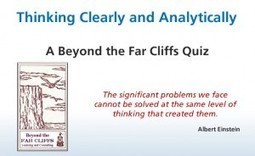







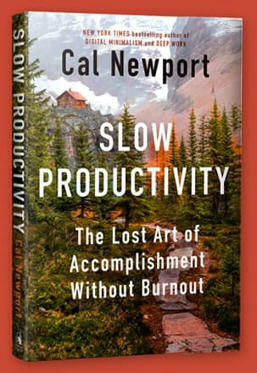
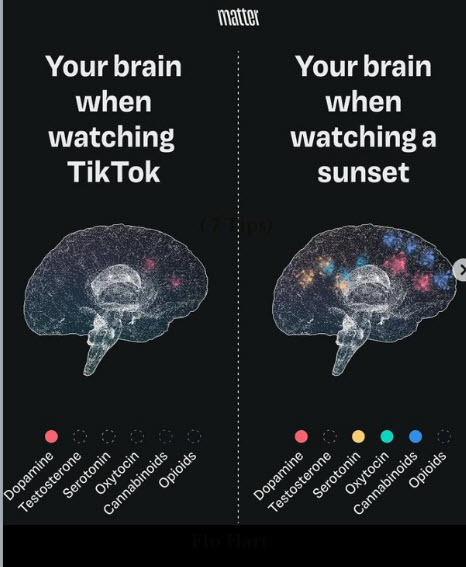


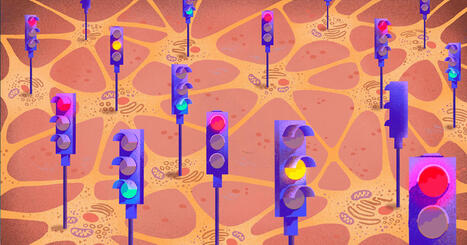








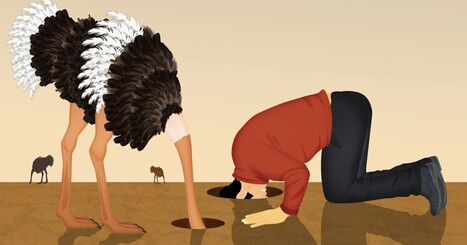

![A System for Deep Focus [Activate Your 5 Senses] | Thinking Clearly and Analytically | Scoop.it](https://img.scoop.it/9h6fZW-lepI_fFtQQTgOcDl72eJkfbmt4t8yenImKBVvK0kTmF0xjctABnaLJIm9)






The items on this topic are related to thinking and information on brain research. The items posted are frequently directly related to one of my most popular management training programs -- Thinking Clearly and Analytically.